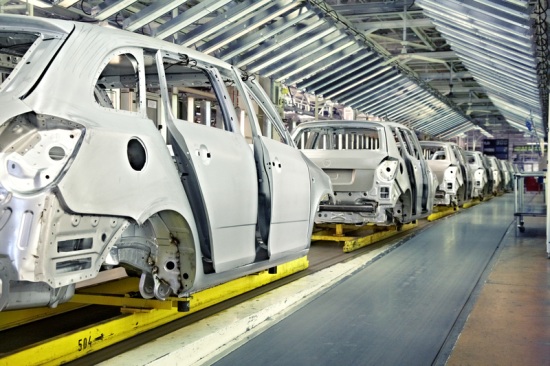The British car manufacturing industry is going from strength to strength in 2012, with companies such as Vauxhall, BMW and Citroen all looking to expand their sites nationwide this year, creating employment for thousands of British workers. Jaguar Land Rover is the latest company to take advantage of the manufacturing boom in this country, with its commercial property factory in Merseyside now becoming operational 24 hours a day, creating up to 1,000 jobs.

At present, more than 30,000 people are understood to have applied for the new positions at the Halewood factory, which will have 4,500 employees when the night shifts begin on Monday. This means that employment at the industrial property has trebled in only three years – defying the theory that employment dips whilst in a recession.
HR Director at Jaguar Land Rover, Des Thurlby, said; “With 4,500 employees, JLR Halewood has trebled its workforce in just three years – and the size of the workforce is now the highest it has been for 20 years.
“JLR is committed to investing in the skills and training of its workforce and many of the 1,500 people recruited to launch the Range Rover Evoque in 2011 have already graduated with an Intermediate Apprenticeship.
“We received more than 30,000 applications for these 1,000 new roles and we are very fortunate that we were able to select such high calibre people for our new jobs.”
Jaguar Land Rover was bought by Tata, an Indian car company, from Ford in 2008 for the pricey sum of £1.5 billion, but has proven to be a worthwhile investment. Since then, profits and demand have both continued to increase year on year, with the brand forced to take on around 8,000 additional staff in the past two years alone.
However, while the Land Rover aspect of the business continues to be a huge generator of profits, Jaguar’s saloon cars are failing to live up to expectations. During the second financial quarter of 2012, for example, Jaguar Land Rover sold 83,452 vehicles altogether.
Of these, 72,000 were Land Rovers, meaning that the Jaguar aspect of the business failed to make over 12,000 sales. Yet parent company Tata are unlikely to be displeased with the results, as the results meant the company’s sales increased by 34 per cent in that quarter alone. In essence, this has put Jaguar Land Rover on track for the record £1.5 billion profits it hopes to make this year alone.
The Range Rover Evoque has proven particularly popular, with almost 90,000 vehicles sold since the model went into production last year. In fact, part of the reason for the expansion of working hours in the Halewood factory is due to the high demand for the Evoque, with customers around the world queuing up to order them.
A 91 per cent sales increase in China has been largely credited to the fashionable car model, which was designed in conjunction with Victoria Beckham. Due to the rapidly expanding middle class in China, the demand for foreign built luxury cars has soared, making the Evoque particularly desirable.
Richard Else, Operations Director at the Halewood commercial property, said; “Our new recruits have worked hard during their assessments and extensive induction training.
“Many have also worked a number of trial night shifts during July to ensure we get off to a great start.
“I am delighted to welcome our new colleagues as they come on-board to help us meet customer demand for the Range Rover Evoque and Land Rover Freelander. Moving production to three shifts and working 24 hours a day will allow us to significantly reduce the time a customer has to wait for their new Range Rover Evoque.”
Do you think the rapid expansion of the British car manufacturing is a positive step in bringing the economy back on to its feet? Or do you think that efforts should be distributed evenly between different industries?
Previous Post
Music Fans and Businesses Prepare For V Festival
This is good news for employment in the area but the number of applicants for the positions shows unemployment is still a big problem despite the recent figures showing a fall.
Totally agree Don!